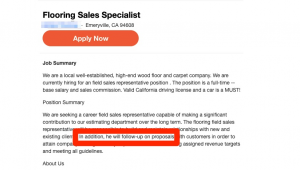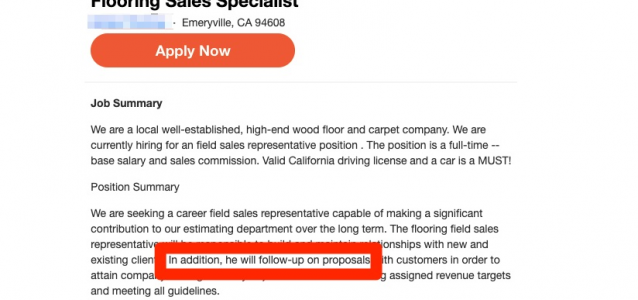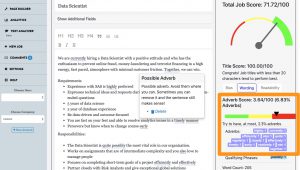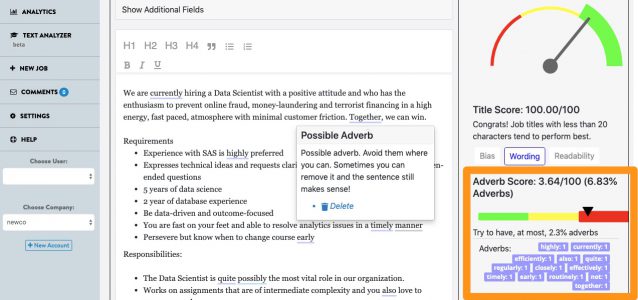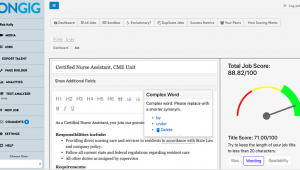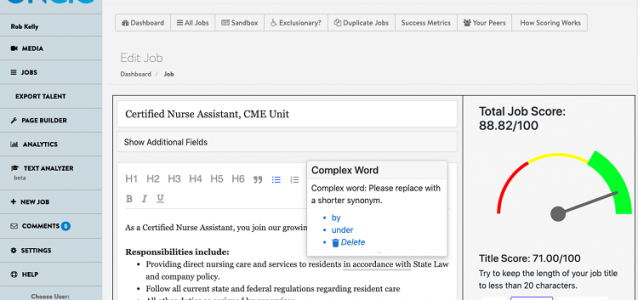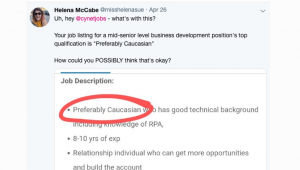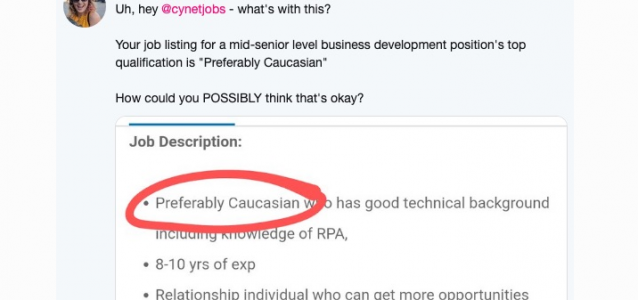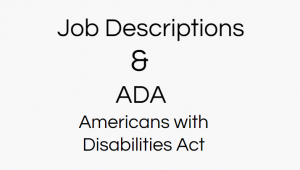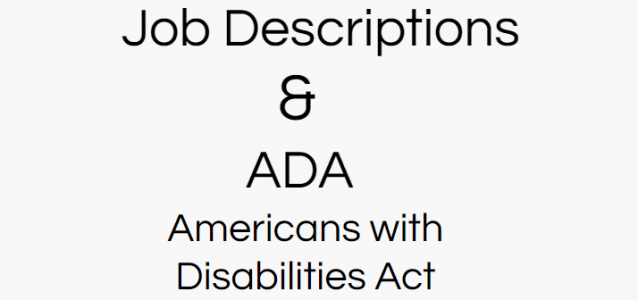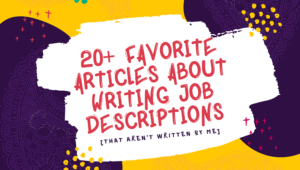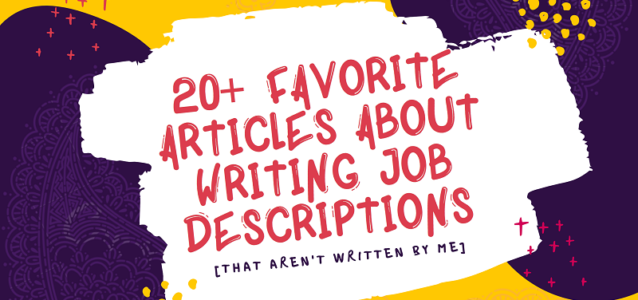Starting your job posting with a question is smart and effective. Just like it’s proven in sales that asking questions can convert customers at 10X the rate than average (see the SPIN Selling book), so too does asking questions in your job ads. The reason? Yep, I just asked YOU the reader a question. 🙂… Read more »
Posts about Writing Job Descriptions
Caution: Avoid These 3 “Exclusionary” Personal Pronoun Mistakes in Job Descriptions
Using the wrong personal pronoun (he, she, his, her, etc.) can turn off groups of candidates. Here are 3 examples of personal pronouns NOT to use along with synonyms I recommend. Personal Pronoun/Job Description Tip #1: Don’t Refer to Candidate as “He” Check out this first job ad below. In the second paragraph it reads:… Read more »
Top 50 Most Used Adverbs in Job Descriptions (+ ones to delete)
A talent leader asked me when she should use adverbs in writing job descriptions. So, it turns out that using too many adverbs in your job descriptions reduces your apply rate (more on that below). Reminder on the definition of adverbs: adverbs are intensifier words that give greater definition to an adjective, verb or other… Read more »
50 Phrases to Avoid So You Don’t Have Clinical-Sounding Job Postings
Do your job postings have clinical-sounding words? Do they sound “prescriptive”. Perhaps they look like an attorney wrote them — full of “legalese”. Your job posting should, of course, be an ad…not a legal contract. Check out the beginning of this nursing job ad below (analyzed by Ongig’s Text Analyzer job description software). Ongig’s software… Read more »
7 Best Practices for Using Bullets in Job Descriptions
How many bullets should you use in a job description? Does your job posting have too many bullets? Great questions. I’ve been asked a bunch of these job description bullet-related questions. I did my best to answer those and more below. It’s all the best practices I know about the most effective use of bullets… Read more »
Newsday Gets Hammered On Disability Language for This Job Posting
On the heels of 7 Controversial Stories About Job Descriptions, here’s another cautionary tale of poor wording in job postings. It was discovered by Wendy Lu, a self-prolaimed “Proud Disabled Woman” (vocal cord paralysis). Wendy found a job ad posted by Newsday, the Long Island-based newspaper in New York, for a general assignment reporter. It included… Read more »
12 Examples of Poorly Written Job Descriptions
Poorly written job descriptions share certain things in common. I’ve analyzed (by hand) many thousands of job descriptions and created this checklist of the”worst job description practices” to avoid. 1. Poorly Written Job Descriptions Have Long Job Titles The job title is key. It’s usually the first thing a candidate sees. Job titles with 1… Read more »
7 Examples of Well Written Job Descriptions [With Tips!]
Well written job descriptions aren’t easy to come by. Most JDs are written by busy hiring managers or recruiters. They read more like a legal contract than clean ad copy. Below are 7 tips based on examples of well written job descriptions I found on the web. For more tips on writing job descriptions, check… Read more »
5 Lessons I Learned from Cynet’s “Preferably Caucasian” Job Posting Debacle
When Cynet Systems, an Inc. 5000 company out of Ashburn, Virginia, had its job posting debacle last month, I decided not to write about it. Cynet CEO Nick Budhiraja and his team had reached out to Ongig (we have software that helps avoid such issues). I thought I’d hold off on giving my take on… Read more »
Employer Required to Pay $250K for Poorly Written ADA Job Description
The placement of a single bullet in a University’s job description cost it $250,000 under the Americans with Disabilities Act (ADA). Job descriptions, under the ADA, can be the “evidence” that courts use to rule in a lawsuit. This is a cautionary tale for employers, especially those who consider rotating work schedule to be an… Read more »
10 Tips for Recruiting People with Disabilities in Job Descriptions
People with disabilities can, of course, be your most productive workers. But just one word or phrase could make them feel excluded. This bias against people with disabilities is also called ableism. One type/example of ableism in job descriptions is the words we use to describe physical demands. If a candidate has a physical disability,… Read more »
20+ of My Favorite Articles About Writing Job Descriptions [that aren’t mine!]
I’ve written what I hope you find useful content on job descriptions (see job description articles, job ad articles and our free Job Descriptions Guide. But there are so many awesome articles out there written by others. And I love giving shout-outs where they’re due. Here are my favorite articles on job descriptions, job postings and job ads. 20+… Read more »
New Study Shows Gender Bias Against Women for “Brainy” Jobs
Women are less likely seen as good candidates if the job mentions a high degree of intellectual ability, according to a new study. In 3 tests, published in the journal American Psychologist, more than 1,150 participants were asked to refer individuals for a job. Half of the participants were told that the job description required… Read more »
5 Examples of “Complex Words” That Hurt Your Job Ads
Every word in your job ad counts. But your job postings often have complex words or phrases you don’t need — they sound more like legalese than a job advertisement. Replace or cut these complex words/phrases and your job ad’s apply rate can see a major boost. You’ll also often see an increase in good candidates…. Read more »
How Long Should a Job Title Be?
I’m sometimes asked how long a job description title should be. Below are a few opinions from others I trust. Note: This article is part of our ongoing series called Job Titles: The Definitive Guide. 1 to 3 Words Job titles with 1 to 3 words had an apply rate twice as high as those with… Read more »


